
|
Sale 58
Manuscript, Collectibles and Aerospace Auction
| Lot |
Photo |
Description |
Realized |
Lot 1 |
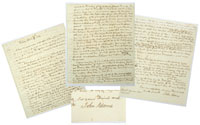 |
Adams, John (1735-1826) Second President of the United States (1797-1801). Autograph Letter Signed "John Adams," 3 pages, 8¾ x 7¼ in., Quincy (Mass.), April 20, 1809. To Joseph Lyman, a well-known Massachusetts clergyman, regarding the independence of the nation, war with England or France, and Alexander Hamilton�s "treachery."
Adams delivers a stinging rebuttal to accusations that he has betrayed his Federalist principles, He stoutly defends his Administration, recalling with anger the "Machiavellian Intrigues" of Hamilton and his colleagues during the 1800 election, and expresses his support for war against Britain or France should either country "render [it] necessary."
By April of 1809, "the late President John Adams" had begun an attempt to rehabilitate his sullied political reputation. In a three-year series of letters to the Boston Patriot newspaper, Adams vehemently rebutted Alexander Hamilton�s earlier calumnies and presented his side of the story regarding the "quasi-war" with France in 1799-1800 and the divisive presidential election of 1800. Especially rankling to Adams had been the 1806 publication of a history of the American Revolution, written by former friend Mercy Warren, that accused him of abandoning the ideals of that uprising. Now, with Hamilton dead (killed by Aaron Burr in the legendary 1804 duel), Jefferson out of office, and his own son, John Quincy Adams, split from the Federalist party, Adams at last felt free to defend himself publicly and to voice his long-festering anger at his betrayal by fellow Federalists.
Adams opens this reply to Joseph Lyman by vigorously countering the argument that he has "forsaken the Persons and Interests" of his friends. Lyman had written to Adams in March in response to a published handbill attributed to the former president. In an alternately obsequious and reproving letter, Lyman tried to convince Adams that by criticizing Federalists before an upcoming state election, he was abandoning his true friends. He further argued that Adams himself must surely oppose a war against England, having supported the British and avoided war with France during his own administration.
Adams minces no words: "…The Leaders to whom the Federal Party has now blindly abandoned itself were never my Friends. I have departed from no Principle. My invariable Principle for five and thirty years has been to promote preserve and secure the Integrity of the Union and the Independence of the Nation, against the Policy of England as well as France." His success in resolving the 1799-1800 crisis with France, he adds, was met with "no thanks from the Republicans" and "nothing but Insolence…from the Federalists." Adams further insists that if Lyman�s namesake, the late Massachusetts congressman Samuel Lyman, were alive today, he would also expose "the treachery of my pretended federal Friends" during the election of 1800. It had been widely rumored that Alexander Hamilton had schemed to deprive Adams of the presidency by trying to ensure that Adams�s running mate, Charles C. Pinckney, receive "equal" support from the electors. (At that time, president and vice president were not voted for together; had Pinckney received the greatest number of electoral votes, he would have been named president.) Adams notes additional evidence of the conspiracy: at a May 1800 meeting of the Society of the Cincinnati, a secretive organization of former Revolutionary War officers, the group had elected Hamilton its new leader and agreed to "sacrifice Adams" in favor of Pinckney. Other Federalist leaders were in on the plot, Adams says, as were elements of the British press under the influence of George Canning, the current British foreign minister. "I know the French influence drove me into banishment: but it would not have had the power if it had not been essentially assisted by the Pharisaical Jesuitical Machiavellian Intrigues and Influence of the leading Federalists."
As Adams wrote, the United States found itself at the brink of war once again. In 1804, Britain had decided to put an end to neutral trade with its enemies by enforcing an extensive blockade of West Indian and European ports. In retaliation, Napoleon issued the "Berlin Decree," banning all trade with Britain. American merchant ships that ignored these edicts were subject to capture; their crews risked impressment. The situation came to a head in 1807, when a British warship just outside American territorial waters fired on the U.S.S. Chesapeake, killing three crewmen and wounding eighteen others. Jefferson�s solution to the crisis, an embargo on American shipping, proved both economically and politically disastrous. Federalists strenuously opposed the embargo and took a pro-British stance. In New England, there was even talk of open rebellion against the federal government. Here, with mounting anger, Adams refutes Lyman�s assumption that he agrees with the Federalist position: "I assure you Sir, A War with England will not meet my 'Hearty Reprobation' if England makes it necessary. England and France have both given us just cause of war. But neither has yet made it necessary. The first of the two that shall render war necessary shall have my vote for it….Great Britain is the first Sinner, and the original Guilt of our present Calamities lies at her door: though France in point of actual Transgression is not much behind her. "
In a conclusion fairly dripping with sarcasm, Adams, once a devoted Federalist, questions how the party can get along with "their new Friends the old English. If they Succeed I shall wish them Joy: but I cannot expect to live to enjoy that felicity." Anglo-American relations continued to deteriorate, and the current president, James Madison, was unable to avoid war. Before emerging from the War of 1812 with a last-minute victory at the Battle of New Orleans, America would suffer thousands of casualties and the British would burn much of Washington, D.C. to the ground, including the White House.
Remarkable for its display of controlled fury, this letter shows a retired John Adams still nursing political wounds almost a decade old and, at the same time, displaying his unswerving devotion to the "Integrity of the Union and the Independence of the Nation," no matter what the cost. One of the finest Adams Autograph Letters Signed in private hands.
Estimated Value $100,000-UP.
View details and enlarged photo
| Unsold |
Lot 2 |
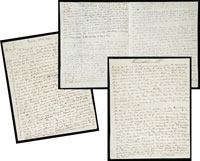 |
Adams, John. Autograph Letter Signed "J. Adams," 4pp, 9 5/8 x 7¾ in., Quincy (Mass.), October 10 and December 19, 1808. Fine; boldly penned and signed.
In part: "I cannot…wholly defend the long Continuance of the Embargo. I thought it at first a necessary Measure, but was fully apprehensive it could not be long continued. I am neither an Advocate nor an accuser of Mr. Jefferson without discrimination. I can acquit him of Partiality to Napoleon, but not entirely to the french Nation. I have long known his bias to the French and his bitterness to the English….Mr. Jefferson in my opinion has long ago adopted two very erroneous opinions. 1. That England was tottering to a fall. That her Strength and Resources were exhausted, that she must soon be a Bankrupt and unable to maintain her naval Superiority. This I never believed and we shall yet have proofs enough and to spare of her tremendous Power, though I dread it not. Tom Pains Reflections in the Rubicon and his other Prophecies of British Revers[e] I personally know were Mr. Jeffersons opinions and continued to be so even when he was Vice President. 2. But the second opinion was still more erroneous and still more fatal. He did not study the French Nation, nor consider the Character of her Court, her Nobility, her Clergy, her Lawyers, her Institutions, and much less the nature of her common People, not one in fifty of whom could write or read. He had studied so little the nature of Man, and still less the nature of government, that he came from France and continued for years fully persuaded that that Nation would establish a free Republican government and even a levelling Democrary, and that Monarchy and Nobility would be forever abolished in France….his opinions recommended him to the French Revolutionary Government and Nation; and especially to all the French Ambassadors, Consults and other agents…even to Tallerand and the Duke de Liancourt [Rochefoucault] who all exerted all their influence…to exalt Mr. Jefferson over my shoulders, and to run me down as an Aristocrat and a Monarchist….my opinion of the French Revolution produced a coldness towards me in all my old Revolutionary Friends and an Inclination towards Mr. Jefferson which broke out in violent Invective and false imputations upon me and in flattering Panegyricks upon Mr. Jefferson, till they ended in a consignment of me forever to private Life and the elevation of him to the Presidents Chair. My Writings were but a Pretext. They knew that neither Aristocracy or Monarcy were recommended to this Country in any of them…."
On December 19 he continues the letter, noting that the palsy in his right hand has not kept him from holding a pen, adding "nor have I ceased to contemplate the Crisis of our affairs. Nor am I fearful of committing my Thoughts to Paper….It would be vanity to sett up my own System as the only one that could have saved us….Si velis Pacem para bellum, is by the Federalists said to be Washingtons Doctrine….My System has always been to prepare for war so far as to fortify our most important and most exposed Places on the Frontier and on the Seaboard, and to prepare for War by Sea so far as to build Frigates and other Smaller Vessells Schooners and Brigantines, by degrees as our Revenues could afford….To what use are 100,000 Militia to defend our Merchandise at Sea? to what End are 2 or 300 gun boats to protect our Commerce? For what Purpose can Ten thousand Troops on the Continent of America, for the protection of our ships in the Mediterranean the Baltic the English Channel the Bay of Biscay, or the West indian or East indian oceans? The Embargo I presume must be relaxed. If not it will either produce a general violation of it, which will cost more than foreign war….Mr. Madisons Administration will be a scene of Distraction and Confusion if not of Insurrections and Civil War, and foreign War at the same time both with France and England if the Embargo is not lightened. Why then are not orders given to equip and man all the Frigates we have and to build more in all our great Seaports? It is in vain for me, who stand unconnected and alone the object of the Jealousy and aversion of both Parties, to repeat the opinion which I have uniformly held and always inculcated for more than thirty years that a Navy is our natural and our only Defence…."
There is much more superb content in which he gives his opinion of embargoes, refers to the 1774 Congress, quotes Patrick Henry, and ends by saying," Yet I have raised no clamour against these Measures, being determined to support the government…as far as I can in Conscience and in honour." He signs at the bottom of the 4th page, then writes a vertical note down the left margin of the 1st page, dated Dec. 20th, "I have no Clerk and must send this Letter without preserving a copy. Therefore burn it." The recipient, of course, knew better than to burn such a letter. A landmark John Adams Autograph Letter Signed.
Estimated Value $100,000-UP.
View details and enlarged photo
| Unsold |
Lot 3 |
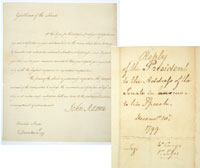 |
Adams, John. Manuscript Letter Signed "John Adams" as President, one page, 9¾ x 8 in., Washington, December 10, 1799. Fine. Addressing the "Gentlemen of the Senate," Adams writes: "I thank you for this address. I wish you all possible success and satisfaction, in your deliberations on the means, which have a tendency to promote and extend our national interests and happiness - and I assure you, that in all your measures, directed to those great objects, you may at all times rely with the highest confidence on my cordial co-operation.
The praise of the Senate so judiciously conferred on the promptitude and zeal of the troops, called to suppress the insurrection, as it falls from so high authority, must make a deep impression, both as a terror to the disobedient and an encouragement of such as do well."
An undeclared naval war between France and the United States -- the Quasi-War of 1798-1800 -- led the Federalist-controlled Congress to pass two controversial pieces of legislation: the Alien and Sedition Acts, to counter perceived subversion within the United States by immigrants and native-born Republicans, and the first direct federal tax on the citizens of the United States. This tax on land, houses, and slaves was needed to pay for coastal defense preparations against France.
Houses were valued for tax purposes by counting the number of doors and windows in each dwelling. Resistance to this "Window Tax" was especially pronounced among eastern Pennsylvania residents of German origin, since it seemed overly reminiscent of the "Hearth Tax" which had caused many of them to emigrate. Bands of armed men chased out federal tax assessors and freed fellow tax resisters who had been taken prisoner by federal marshals in Bucks and Northampton counties in March of 1799. Ironically, four years earlier, John Fries, the leader who gave his name to this tax revolt, helped suppress the Whiskey Rebellion against a federal excise tax in western Pennsylvania.
President Adams� proclamation of March 12 declared that these actions amounted to treason under the Sedition Act. Troops raised from other counties quickly routed the rioters and captured their leaders. Fries and three others were convicted and sentenced to be hanged.
In the immediate aftermath, it appeared that another serious threat to the federal government had been avoided. But in reviewing the petitions for clemency of Fries and the others, Adams came to realize that this insurrection was not a serious challenge to the federal government, but rather resistance by a few country farmers to oppressively heavy taxes. For Adams, then, the "rebellion," while a "riot, highhanded, aggravated, daring and dangerous indeed," was certainly not "treason." Adams wrestled with his final decision before pardoning the rioters in the spring of 1800. This action cost the President critical support from the conservative wing of his own Federalist Party. A beautiful Adams letter in choice condition.
Estimated Value $30,000 - 40,000.
View details and enlarged photo
| Unsold |
Lot 4 |
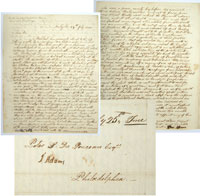 |
Adams, John. Remarkable Manuscript Letter Signed "John Adams," 2pp, 10 x 8 in., front and verso. Montezillo [Quincy, Mass.], July 24, 1821. Integral leaf addressed by his granddaughter Susanna to "Peter S. DuPonceau Esqre/Philadelphia." Postal markings "Quincy MS July 25th Free," franked "J Adams" in blank area at the upper left of "Philadelphia." There was too much ink in Adams� pen when he signed this letter resulting in a slight blotting (the integral address leaf was folded before it had dried) and show-through. The distinct dark franking signature has been slightly smudged, possibly by Adams himself, resulting in what appears to be a partial fingerprint. Minor soiling at the edges. The letter has been expertly strengthened and repaired at the seal tear.
Adams thanks Peter S. DuPonceau for his recently published pamphlet, "A Discourse on the Early History of Pennsylvania," the Annual Oration delivered before the American Philosophical Society in Philadelphia on June 6, 1821. Elected to the A.P.S. in 1791, attorney Peter S. DuPonceau (1760-1844) was at the time a Vice President of the Society, serving as its President from 1828-1844.
In part, "…The History of Pensylvania [sic] is an interesting subject not only to her citizens but to all America and to all the World � The character of Mr Penn is as amiable as it was great, I hope you will find time to write the history of both, for I believe that no man possesses talents and industry that are better fitted for the service. � Your painting in the 24th page of the arrival of the gallant Ship, and her sailing up the river, and the conference under the great Elm is exquisite. These events ought to be celebrated with as much ardor as our 22d December [the day the Pilgrims landed on Plymouth Rock--Dec. 11 in the Julian calendar]. Mr. Penns recognition as brethren of all who believed in one God, the upholder and supporter of the Universe is worthy of eternal remembrance and universal imitation; but you will pardon me if I think your panegyric in the 12th page is some what too eloquent, it is true, that Mr Penn had a great and powerful mind as a Theologian, he may be ranked with Mr Whitfield and Mr. Wesley Count Zinzendorf and Baron Swedenbergh as a law-giver may be classed with Milton Lock, Hume Franklin and Sieyes and surely this is glory enough for a great man; but they are altogether not worth one Montesquieu or one Vattle [sic, probably Voltaire who is mentioned elsewhere in the pamphlet]. This treatment of the Indians is very amiable and exemplary, but all his exertions together in their favour are not to be compared with those of the great Elliot of fifty years before � It must be remembered that he had to deal with the Lennimenape [sic, Lenni Lenape] who were a peace society long before his arrival. If we believe Heckewelder and not the fierce ferocious blood thirsty race which the Plymouth adventurers and Mr Elliot had to encounter and that race fostered encouraged stimulated, furnished with arms ammunition and the art of using them by Morton and Gardner the friends and advisers of Arch Bishop Laud. Moreover it ought not to be forgotten that Mr. Penn was a courtier in the reigns of Charles and James. That he owed his vast acquisitions to their justice or their favour � that they courted him to promote a toleration of the Catholic religion, which the English nation then thought equivalent to an establishment of it and the total extirpation of the protestants � Nor should his raging appetite for land be forgotten not content with the vast territory of Pensylvania he thirsted for New Jersey and Deleware. His name always reminds me of a saying of one of your countrymen Mr Bouteneau of Boston a Man of fortune amd excellent Character a refugee from persecution in France, who said mankind is never satisfied � If I did own the whole town of Boston I should not be contented � I should say Charlestown is so handy � Genghis kan said the whole globe is not sufficient to satisfy the ambition of a great man, and if Mr Penn had possessed the whole Globe it seems to me as if he would have wept, that there was not another globe within his reach to purchase. Such alass [sic] were the infirmities of the greatest and best Men, which our species has produced. This is between ourselves I should be unwilling to see it public, because it must offend the citizens of Pensylvania and the whole body of friends, for all of whom I have too much respect, esteem, and affection, to offend any of them without necessity…."
Note at upper left of first page: "In the handwriting of Miss Adams/Now Mrs Treadway," penned in an unknown hand between 1833 and 1884. The text of the letter is in the hand of his granddaughter, Susanna Boylston Adams Clark Treadway (1796-1884), daughter of his son Charles Adams (1770-1800). After her father died on November 30, 1800, four-year-old Susanna moved into the newly occupied White House with her mother Sarah, whose brother William was married to John Adams� only daughter, Abigail. She was the first child to live in The White House.
Included is the first edition pamphlet (not the one sent to Adams), 38 pages, 8¼ x 5 in., Philadelphia: Printed and Published by Abraham Small, No. 165, Chesnut Street. 1821. Last two pages, unrelated to the oration, are loose. Inscribed on the cover title page in the upper right by DuPonceau "Presented to the Hon: Thos [partially cut off]/By his most obed Servt/The Author." Printed number "89947" on verso of title page and on page 33. Light soiling. Blank margins probably trimmed. Howes D583. Sabin 21379. AI 5213. Wilkinson 6953.
An article about the discovery of this letter was reported a few years ago in "Philadelphia" magazine, estimating its value at $125,000. Ex John F. Fleming with his original presentation folder, c. 1940s.
Estimated Value $16,000 - 20,000.
View details and enlarged photo
| Realized
$13,800 |
Lot 5 |
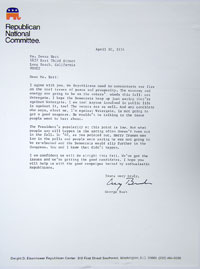 |
Bush, George (1924 -) 41st President of the United States (1989-1993) Typed Letter Signed "George Bush" on Republican National Committee letterhead, one page, 11 x 8½ in., Washington, D.D., April 10, 1974. Fine. Addressed to Deena Hart in Long Beach, California, with excellent content. In part:
"…We Republicans need to concentrate our fire on the real issues of peace and prosperity. The economy and energy are going to be on the voters' minds this fall: not Watergate. I hope the Democrats keep up just saying they're against Watergate. I am too! Anyone involved in public life is against it, too! The voters are as well. And any candidate who says, elect me, I'm against Watergate, is not going to get a good response. He wouldn't be talking to the issue people want to hear about. The President's popularity at this point is low. But what people say will happen in the spring often doesn't turn out in the fall. In '48, as you pointed out, Harry Truman was low in the polls and people were saying he was not going to be re-elected and the Democrats would slip further in the Congress. You and I know that didn't happen. I am confident we will do alright this fall…."
The Republicans did not do alright. In the 1974 midterm elections, Democrats picked up 43 House seats and four Senate seats. In 1973, amid the Watergate scandal, President Nixon had asked Bush to chair the Republican National Committee. Bush remained loyal to Nixon but as the facts of Nixon's involvement came out, Bush recommended that Nixon resign, which he did on August 9, 1974.
Estimated Value $2,000 - 2,500.
View details and enlarged photo
| Realized
$2,350 |
Lot 6 |
 |
[Bush, George W. and Laura]. Four Christmas ornaments with handpainted depictions of the White House, given by President and Mrs. Bush to their personal friends and staff. The Bushes gave handpainted ornaments, limited to approximately 1000, each year from 2003-2008. The four in this lot are from the years 2004, 2006, 2007, and 2008. Each is approximately 4 inches by 3 inches and is housed in an individual 4 x 6 in. box with a vignette of the White House on the cover and tied with a ribbon which matches the one on top of the ornament. Each has a Certificate of Authenticity which identifies it as an Heirloom White House Ornament, states that the President and Mrs. Bush commissioned its creation by the named artist (Seton McGlennn for 2004 and 2006, Michael Glenn Monroe for 2007, and Barbara Franzreb for 2008), and gives the number of ornaments in the limited edition. Pristine condition. A printed "Season's Greetings" card from President and Mrs. George W. Bush, with an image of Barney, is included in the lot.
Estimated Value $750 - 1,000.
View details and enlarged photo
| Realized
$940 |
Lot 7 |
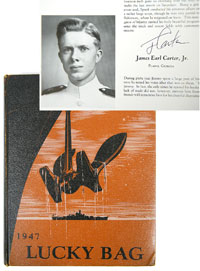 |
Carter, Jimmy (1924 -) 39th President of the United States (1977-81). 1947 Yearbook for The United States Naval Academy Signed "J Carter," n.p., n.d. (2009). The yearbook, called "Lucky Bag" weighs a hefty 8½ pounds. It was signed personally by Carter in 2009. Carter entered the U.S. Naval Academy at Annapolis in 1943 and graduated in June 1946. He married Rosalynn Smith in July of '43 and was stationed on ships out of Norfolk, Virginia, Pearl Harbor, Hawaii, New London, Connecticut, and San Diego, California. In 1952 he was accepted into Admiral Hyman Rickover's elite nuclear submarine program. When Carter's father died in 1953, he was honorably discharged from the Navy to go home to Plains, Georgia and run his father's peanut business.
Estimated Value $300 - 400.
View details and enlarged photo
| Realized
$176 |
Lot 8 |
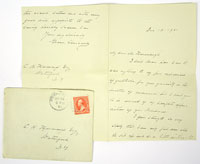 |
Cleveland, Grover (1837-1908) 22nd and 24th President of the United States (1885-89 and 1893-97). Autograph Letter Signed "Grover Cleveland" on stationery embossed "Westland, Princeton, New Jersey," 3½pp, 6¾ x 4½ in., Dec. 13, 1901. With holograph envelope addressed to C.H. Kavanaugh, who seems to be a haberdasher or tailor, in Waterford, N.Y. Cleveland express his appreciation "for your generosity in the matter of underwear" and adds, "I gain strength so very slowly that I am only just now able to sit up and do a little writing…." He goes into detail about alterations that need to be made in clothing but notes, "There will be no difficulty in my comfortably wearing the suit you sent me…." Light toning, else fine. In 1899 Cleveland was appointed Henry Stafford Little Lecturer in Public Affairs at Princeton University, and in 1901 joined the board of trustees.
Estimated Value $600 - 800.
View details and enlarged photo
| Realized
$600 |
Lot 9 |
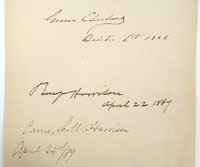 |
Cleveland, Grover, Benjamin Harrison & Caroline Scott Harrison. A remarkable combination of autographs: Autograph album page signed by Grover Cleveland as President, October 6, 1886 and by Benjamin Harrison ("Benj Harrison") as President, April 22, 1889, and Caroline Scott Harrison ("Carrie Scott Harrison") as First Lady, April 24, 1889. Cleveland signed the page during his first administration (1885-89) and President and Mrs. Harrison signed not long after Harrison was inaugurated. It is rare to find Caroline Harrison's full signature and even rarer to find it as "Carrie Scott Harrison." In the 1888 election, Cleveland received more of the popular vote than Harrison, but Harrison won in the Electoral College. On the verso of the page are signatures of William Jennings Bryan, three-time presidential candidate; James G. Blaine, the Republican candidate that Cleveland defeated in 1884; and Champ Clark, Speaker of the House for eight years.
Estimated Value $1,400 - 1,800.
Charles Hamilton Auction, 7/19/1979, realized $1650.
View details and enlarged photo
| Unsold |
Lot 10 |
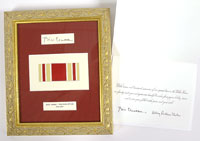 |
Clinton, Bill. Autograph Christmas gift from Bill Clinton to his staff in 2000. Only 200 of these were given. The gift is composed of an original signature by Bill Clinton, matted with a 1½ x 3½ in. swatch of burgundy, gold, and cream sofa fabric from the Oval Office. The two items are beautifully matted and framed to an overall size of 10½ x 9 in. Accompanied by a White House Christmas card from 2000, with facsimile signatures by the President and First Lady, still in the original envelope with "The White House" as the return address.
Estimated Value $400 - 600.
View details and enlarged photo
| Realized
$764 |
Lot 11 |
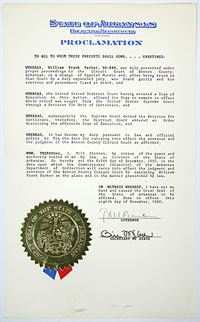 |
Clinton, William J (1946 -) 42nd President of the United States. Document Signed "Bill Clinton" as Governor of Arkansas, one page, on State of Arkansas/Executive Department stationery, 14 x 8½ in. (Little Rock), November 8, 1990. A proclamation reciting the appeal results in the capital murder case of William Frank Parker and fixing the date of his execution. Signed by Clinton and Arkansas Secretary of State Bill McCuen, to the right of a pristine gold-foil state seal. Very fine; one fold.
In part, the proclamation notes that "WHEREAS, the United States District Court having entered a Stay of Execution in this matter, allowed its Stay to remain in effect while relief was sought from the United States Supreme Court through a Petition for Writ of Certiorari; and WHEREAS, subsequently the Supreme Court denied the Petition for Certiorari, therefore, the District Court entered an Order dissolving the effective Stay of Execution; and WHEREAS, it has become my duty pursuant to law and official policy to fix the date for carrying into effect the sentence and the judgment of the Benton County Circuit Court as affirmed….I Bill Clinton…as Governor of the State of Arkansas, do hereby set the fifth day of December, 1990, as the date upon which the Commissioner (Director) of the Arkansas Department of Correction will carry into effect the judgment and sentence of the Benton County Circuit Court by executing William Frank Parker at the place and in the manner prescribed by law…."
Parker was sentenced to death for the 1982 killing of his inlaws. During his imprisonment, he converted to Buddhism and became somewhat of a cause célèbre, with the Dalai Lama and others lobbying for removal of the death sentence. Although Clinton signed the document setting the date for Parker's execution, various postponements occurred; Parker was executed by lethal injection on August 8, 1996, after Governor Clinton had become President Clinton.
This is the first execution order signed by an American president that we have seen.
Estimated Value $3,000 - 5,000.
View details and enlarged photo
| Realized
$1,725 |
Lot 12 |
 |
Eisenhower, Dwight D. Three Typed Letters Signed, all on letterhead engraved "DDE" letterhead, one page each, 9 x 6¼ in., two datelined Palm Desert, California, one on Feb. 8, 1963 and one on March 12, 1965; the third is datelined Indio, California, Feb. 9, 1968. All are to Mr. Porter Washington in Beverly Hills, California, thanking him for gifts of dove, quail, and pheasants. In one, Ike says, "I am told that you had me in mind when you shot them and I assure you I shall have as much fun eating them as you did shooting them…." In another, he says that he will save the doves for one of his stag luncheons, and in the third, he writes that he has been "playing the part of host…as Mrs. Eisenhower is away…." All very fine. Matted together and framed to an overall size of 13½ x 26 in. Porter Washington was the husband of Lucy Doheny, of the prominent Doheny family of Los Angeles.
Estimated Value $600 - 800.
View details and enlarged photo
| Realized
$510 |
Lot 13 |
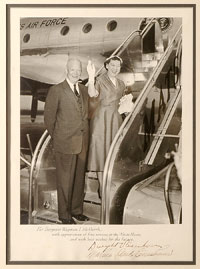 |
Eisenhower, Dwight D. & Mamie Doud Eisenhower. Photograph Signed as President and First Lady, 13 x 9¼ in., n.p., n.d. (1954). The First Couple stand on the ramp of Air Force One (Columbine) on August 21, 1954, on their way to Denver, Colorado. The printed inscription says, "For Sergeant Wayman I. McGarrh with appreciation of fine services at the White House and with best wishes for the future." The Columbine departed from Andrews Air Base in Washington, D.C. Photo by Abbie Rowe of the National Park Service. Fine except for a couple of minor creases at bottom and some ink skips in Mamie's signature. Handsomely matted and framed to an overall size of 19½ x 15¾ in. An uncommonly large and attractive photo of Ike and Mamie.
Estimated Value $1,000 - 1,200.
View details and enlarged photo
| Unsold |
Lot 14 |
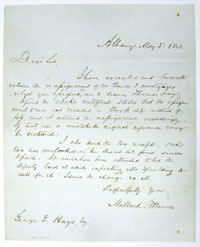 |
Fillmore, Milliard (1800-1874) 13th President of the U.S. (1850-53). Autograph Letter Signed as New York State Comptroller, one page, 9¾ x 7¾ in., Albany, May 5, 1848. Fillmore writes to Mr. Hays regarding the reassignment of some bonds & mortgages for Thomas Day and says that the clerk's certificate incorrectly stated that the assignment was recorded in Book 42 instead of Book 46. He also refers to tax receipts which he is sending [not present]. "Our tax was overlooked in the search but found since & paid…the deputy laid it aside expecting Mr. Spaulding to call for it…." Boldly penned and signed on pale blue paper. Fine except for a couple of tiny foxing spots.
As New York State Comptroller from 1848 to 1849, Fillmore revised New York's banking system and made it a model for the future National Banking System. Two years earlier, in 1846, he was a founder of the University of Buffalo, which today is the State University of New York at Buffalo (SUNY Buffalo), the largest school in the New York state university system.
Estimated Value $600 - 800.
View details and enlarged photo
| Realized
$441 |
Lot 15 |
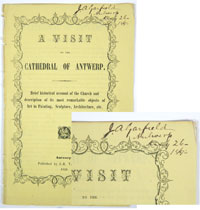 |
Garfield, James A (1831-1881) 20th President of the United States (1881). Booklet Signed "J.A. Garfield/Antwerp / Aug 26- / 1867" on cover. Titled "A Visit / to the / Cathedral of Antwerp. / Brief historical account of the Church and / description of its most remarkable objects of / Art in Painting, Sculpture, Architecture, etc." Antwerp: J.-B. Van Aarsen, 1858. Eight pages plus front cover, 8 x 5¼ in. Fine condition.
Present is a color photocopy of the inside cover of Garfield�s bound pamphlet with his 1½ x 2½ in. bookplate "Inter Folia Fructus / Library of / James A. Garfield." The Latin "Inter Folia Fructus" referred to the leaves of the book: "Among the leaves there is fruit." Also present is a photocopy of the notation handwritten by Garfield, instructing the bookbinder as to the title and endpapers desired "Miscellaneous / Pamphlets / ½ Turkey," i.e. turkey marbled endpapers resembling turkey feathers.
Estimated Value $1,500 - 2,000.
View details and enlarged photo
| Unsold |
Lot 16 |
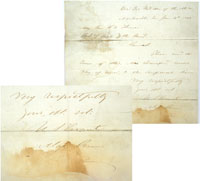 |
Grant, Ulysses S (1822-1885) 18th President of the United States (1869-77). Autograph Letter Signed "U.S. Grant / Maj. Gen." one page, 9¾ x 7½ in., "Head Qrs. Mil. Div. of the Miss. / Nashville Ten Jan. 16th 1864." To Maj. Gen. G. H. Thomas, Head of the Department of the Cumberland: "General, Please send the bearer of this, Mrs. Bransford, under Flag of Truce, to the Confederate lines…." The letter is silked on the verso and bears the scorched markings of a fire; a horizontal fold traverses the lower portion of the signature. This letter to the "Rock of Chickamauga" was written two months before Grant was appointed to the re-created grade of lieutenant general and given command of all the Union armies.
Estimated Value $2,800 - 3,200.
View details and enlarged photo
| Realized
$2,938 |
Lot 17 |
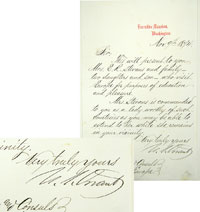 |
Grant, Ulysses, S. Letter Signed "U.S. Grant" as President, on Excecutive Mansion stationery, one page with blank integral leaf, 9 x 5¾ in., Washington, Nov. 9, 1874. A letter written "To U.S. Ministers and Consuls in Europe" to introduce Mrs. E.R. Stevans and family, "who visit Europe for purposes of education and pleasure. Mrs. Stevans is commended to you as a lady worthy of such courtesies as you may be able to extend to her while she remains in your vicinity." Fine; one small stain in blank, lower right corner; the integral leaf is laid to a larger sheet. Nice bold signature.
Estimated Value $1,200 - 1,500.
View details and enlarged photo
| Realized
$891 |
Lot 18 |
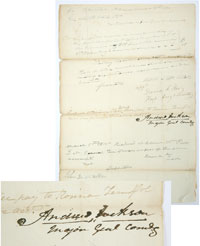 |
Jackson, Andrew. Document Signed "Andrew Jackson Major Genl Comdg," one page, 12¼ x 8½ in., Hospital, New Orleans, March 3, 1815. Very good; browning along edges and at folds. Strong, bold signature and rank.
Less than two months after Jackson�s dramatic victory on the battlefield at New Orleans, he authorizes payment "for Rosina a free girl of colour For 1 month's service as a wash woman in the Hospital for Genl. Cofee's Brigade of T[ennessee] V[olunteer] M[ounted] Gunmen at $10 p[er] m[onth] commencing 3rd Feb & ending 2 March inclusive."
Robert S. Cobb, L.T.C.B., certifies that the price was the lowest "at which, under existing circumstances, washwomen could be procured," which is endorsed by David C. Ker, Hospital Surgeon & Director. Jackson then signs off on the order that Colonel William Piat, the quartermaster general, should pay Rosina $10. Rosina makes her mark on March 5, 1815, acknowledging that she received payment, to which John M. Walker signs as a witness.
At New Orleans, Jackson commanded a motley 4,700-man army composed of volunteers, militia, free blacks and freebooters of Jean Laffite. British General Packenham�s attack on January 15 was decimated by accurate American fire. The seventy American casualties of the battle were subsequently treated in battlefield hospitals already occupied by numerous comrades stricken with climate-induced diseases.
General John Coffee, whose brigade played an integral role in the victory at New Orleans, was a former business partner of Jackson's in Nashville and was married to Jackson's niece, Mary Donelson. In 1806 Coffee had fought a duel with a man who made derogatory remarks about Jackson. Coffee raised the 2nd Regiment of Mounted Riflemen early in the War of 1812 and when the 2nd Regiment was combined with Col. Cannon's Mounted Regiment and the 1st Regiment of Volunteer Mounted Gunmen in 1813, Coffee was promoted to brigadier general and put in command of the brigade. After the War of 1812, Coffee led his brigade under Jackson's command in the Creek War.
Estimated Value $8,000 - 9,000.
Christie�s, The Forbes Collection.
View details and enlarged photo
| Unsold |
Lot 19 |
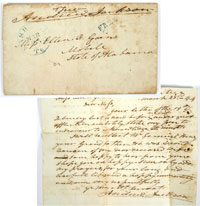 |
Jackson, Andrew. Autograph Letter Signed "Andrew Jackson," one page, 9¾ x 7¾ in, Hermitage, March 23 (18)44. With Free Frank on the integral leaf which is addressed in Jackson's hand to "Miss Ellen F. Gains / Mobile / State of Alabama." An ailing Jackson writes one year before his death, from his home outside of Nashville, answering a woman's question about her relationship to his beloved late wife, Rachel. "Your letter of the 19th of February last is now before me and under great affliction & debility, I take my pen to endeavour to acknowledge its receipt. I well recollect Mr. Lemuell Henry your grand father. He was second cousin of my dear deceased wife. I am happy to hear from you. I hope you are happy. I can only add my prayers, for your long and usefull life, and a happy immortality…." The address panel has a blue "FREE" stamp and blue circular postmark. In spite of Jackson's illness, the letter is boldly penned, addressed, and signed twice. Two small fold tears to letter, and some toning and soiling to address leaf, else fine. Ellen Gains' family owned the docks in Mobile, Alabama prior to the Civil War.
Estimated Value $4,000 - 6,000.
View details and enlarged photo
| Unsold |
Lot 20 |
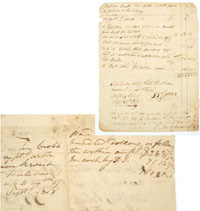 |
Jackson, Andrew. Autograph Document Signed "A.J" and "Jackson" in the text, on verso of ADS "F.T. Crabb," one page, 10 x 7½ in., [Melton�s Bluff, Alabama Territory], September 24, 1818. Penned in full by Jackson: "Doctor Crabb acpts P[ayment] with Jackson & Hutchings up to 24th Sept. 1818. Paid Doctor Crab--one hundred dollars, as follows, the within accts $28.87½ / In cash by A.J. 71.12 ½ [total] 100.00." Light soiling, chipped at edges. Fine condition.
The bill is headed "Doctor Crabb … to the ["Estate" rubbed out] farm of Jacksons & Hutchings." Dated August 3, 1818, the list comprises "Eighteen bushels of corn," "one dusen & a half of fodder," "twenty three pounds of hogs lard," and "cash paid for cotton seed," a total of $28.87½. Dr. Crabb has handwritten the following, "I do hereby certify that the above account is just & true. Melton Bluff, Sepr. 25th 1818. F.T. Crabb. Received all demands in full this 25th Sepr 1818 of Jackson & Hutchings for Medical Services P[ayment] witness our hands & seal Crabb & Rousseau." According to Kay K. Moss in "Southern Folk Medicine, 1750-1820" (Columbia, S.C.: University of South Carolina Press, 1999), hog's lard was used by doctors as a cure for "the itch" and ears of corn were boiled and used as a way of inducing perspiration. Doctors Crabb and Rousseau attended to Jackson�s slaves.
On January 14, 1818, in a letter published in her book, "Letters from Alabama" (Washington: 1830), Anne Newport Royall told of her stay in Melton�s Bluff, then part of Mississippi Territory. In part, "Melton�s Bluff…takes its name from a person by the name of John Melton.… Here is a very large plantation of cotton and maize, worked by about sixty slaves, and owned by General Jackson, who bought the interest of old Melton…" After John Melton died in 1816, Jackson purchased his plantation and his slaves from his son.
Jackson had a business partnership with John Hutchings and John Coffee (who married Jackson's niece and who fought with Jackson in the War of 1812 and against the Creek Indians). Hutchings� son later married Coffee�s daughter. Hutchings died in 1817, but the partnership of Jackson & Hutchings continued to run the plantation.
Present is a photocopy of a bill from Crabb & Rousseau to Jackson dated July 24, 1818, one month earlier, for $260 listing expenses for "medical att[ention[ & medicine with Black family promiscuously from Octr 1817 up to 1st May 1818," "attend & med. Yellow Mary," "Delivery & att. three negro women," and "att on six negroes this month." There is no indication on this bill that it was paid. The July 24, 1818, bill, with no handwritten notations or signature by Jackson, recently sold at public auction for $5676.25. The receipt offered here has 31 words and calculations, including "A.J." and "Jackson," in Jackson's hand.
Estimated Value $4,000 - 5,000.
View details and enlarged photo
| Unsold |
Lot 21 |
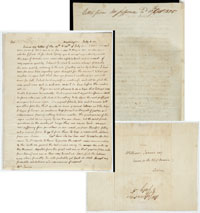 |
Jefferson, Thomas (1743-1826) Third President of the United States (1801-1809); author of the Declaration of Independence. Autograph Letter unsigned, as President, one page, 9¾ x 7¾ in., Washington, July 6 (18)05. With integral leaf addressed in Jefferson's hand to "William Jarvis esq. / Consul for the US of America / Lisbon." Docketed on verso of letter, "Letter from Mr. Jefferson Recd 10th Octr 1805" and on the address leaf, "Mr. Jefferson / 6 July - 5." Fine condition; address leaf is inlaid, seal tear repair, and a few tiny archival tape repairs on verso. Boldly penned. William Jarvis (1770-1859) was the U.S. Consul General to Portugal (1802-11); he founded a trading house in Lisbon and was responsible for introducing the merino breed of sheep from Spain into the United States.
After discussing receipt of "articles of fruits &c." and a " pipe of Arruda wine…of very superior quality," Jefferson moves to matters of national and international importance: "It gives me much pleasure to see a hope that Portugal may be able to preserve her neutrality. That a government so just & inoffensive should be forced into a war with which it has nothing to do, shows the most profligate disregard to human rights. It is a great felicity to us, and it secures all our other felicities, that so wide an ocean is spread between us & the lions & tygers of Europe, as enables us to go forward in the path of justice and independance fearing nothing but our creator. The great powers of Europe could do us injury by sea & on our shores. but the spirit of independance in the country at large they can never bend. we are now suffering from privateers on our coast, and are therefore fitting out a naval force to go & force them to keep a reasonable distance from our shores. Capt Lewis who has been sent to explore the Missouri to it's source, & thence to pursue the nearest water communication to the South sea, passed the last winter among the savages 1600 miles up the Missouri. Deputies from the great nations in that quarter (2500 miles from hence) are now on their way to visit us. Lewis finds the Indians every where friendly. he will probably get back in 1806…."
Although Jefferson hoped that Portugal would not be affected by the Napoleonic Wars, the country was invaded by French forces three times between 1807-14. The country resisted stubbornly and combined with British forces under Arthur Wellesley (who was made Duke of Wellington for his services in the Peninsular War), eventually pushed the French out of the Iberian peninsula.
Because of the Quasi War with France (1798-1800), an undeclared conflict almost totally fought at sea, the U.S. Congress gave President John Adams the authority to acquire, arm, and man twelve ships of up to 22 guns each; these ships represented the rebirth of the U.S. Navy. From 1805 there was a resurgence of piracy, often carried out by English men-at-war and resulting in the impressment of American seamen into the British navy. Additionally, the Louisiana and Gulf coasts, an area plagued by piracy, became part of the United States with the Louisiana Purchase of 1803. These were reasons for Jefferson to be "fitting out a naval force" to force privateers to "keep a reasonable distance from our shores."
The Louisiana Purchase of 1803 set the stage for the major westward expansion of the United States. The Lewis and Clark expedition, known as the Corps of Discovery, was headed by Jefferson's friend and aide, Meriwether Lewis, and William Clark. They were sent by President Jefferson as a scientific expedition to determine the nature and extent of the new purchase; the trip would last for two years (1804-06). President Jefferson wrote to Lewis, "The object of your mission is to explore the Missouri river, and such principal stream of it as by its course and communication with the waters of the Pacific Ocean whether the Columbia, Oregon, Colorado or any other river may offer the most direct and practicable water communication across this continent for the purposes of commerce."
The knowledge that the expedition brought back about the Northwest--its geography, its botany and zoology, and its native inhabitants--stimulated the interest of Americans in this vast territory, and soon the country had a new goal of "Manifest Destiny," a dream of extending its boundaries all the way to the Pacific Ocean. That goal would be realized in 1819 when the Transcontinental Treaty was signed with Spain. An iconic Jefferson letter of the utmost importance!
Estimated Value $100,000-UP.
View details and enlarged photo
| Unsold |
Lot 22 |
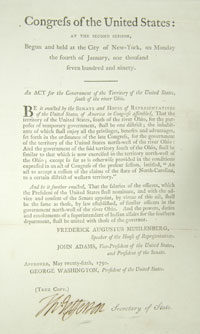 |
Jefferson, Thomas (1743-1826). Third president of the United States (1801-09). Document signed "Th: Jefferson" as Secretary of State, one page, 14 x 8¼ in., New York, May 26, 1790. With light horizontal folds clear of Jefferson�s signature, which is unusually large and bold. Professionally conserved. Signed in type by George Washington as President, John Adams as Vice President, and Frederick Augustus Muhlenberg as Speaker of the House of Representatives. Being "An ACT for the Government of the Territory of the United States, south of the river Ohio," passed by the Second Session of Congress, "Begun and held at the City of New-York, on Monday the fourth of January, one thousand seven hundred and ninety."
In part: "Be it enacted… that the territory of the United States, south of the river Ohio, for the purposes of temporary government, shall be one district; the inhabitants of which shall enjoy all the privileges, benefits and advantages, set forth in the ordinance of the late Congress…And the government of the said territory…shall be similar to that which is now exercised in the territory north-west of the Ohio; except so far as is otherwise provided in the conditions expressed in an act of Congress of the present session, intitled, 'An act to accept a cession of the claims of the state of North-Carolina, to a certain district of western territory."
In 1784, North Carolina ceded its western claims on the Territory of Tennessee to the United States. Residents of eastern Tennessee organized these lands as the "State of Franklin" in honor of Benjamin Franklin. For four years, the State of Franklin maintained a precarious existence plagued by conflict with Indians, internal dissension and ineffectual efforts to obtain official recognition. In 1789, North Carolina was able to reestablish its jurisdiction over this territory because it had been originally ceded under the defunct Articles of Confederation. The land was then transferred to the Constitutional Government in an Act ratified by the General Assembly in December, 1789.
In May 1790, Congress accepted the cession and organized the entire Tennessee area, passing this "Act for the Government of the Territory of the United States south of the river Ohio." It stipulated that the Territory would be governed in accordance with the Northwest Territory Ordinance of June 13, 1787, with the exception of its prohibition of slavery (as demanded by North Carolina when she relinquished the territory in 1790).
President Washington appointed North Carolina�s William Blount as the first Governor of the territory south of the Ohio River. By 1796, the territory had met the requirements for statehood and on June 1, 1796, Tennessee became the 16 state.
Estimated Value $20,000 - 25,000.
View details and enlarged photo
| Realized
$17,250 |
Lot 23 |
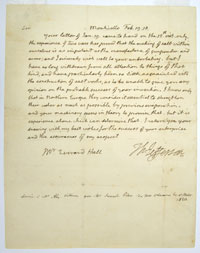 |
Jefferson, Thomas. Autograph Letter Signed "Th: Jefferson," one page, 9¾ x 7¾ in., Monticello, February 19, 1818. To Everard Hall regarding the importance of domestic salt manufactures and an invention of Mr. Hall's related to salt manufacture. Fine; light folds and toning. Another hand has noted at the bottom, in French, that the letter was "given to Mr. Alex. Vattemore by Mr. Samuel Peters of New Orleans May 10, 1840."
Jefferson wrote, in part: "…the experience of two wars has proved that the making of salt within ourselves is as important as the manufacture of gunpowder and arms… but I have so long withdrawn from all attention to things of that kind, and have particularly been so little acquainted with the construction of salt works, as to be unable to give you any opinion on the probable success of your invention. I know only that in Northern Europe they consider it essential to strengthen their water as much as possibl e by previous evaporation, and your machinery seems in theory to promise that, but it is experience alone which can determine that. I return you your drawing [not present] with my best wishes for the success of your enterprise…."
Although often characterized by historians as a strict agrarian, Jefferson understood well the need for domestic manufacturing. As secretary of state under Washington, he advocated raising tariffs to protect fledgling American industries from foreign competition. "Such duties having the effect of indirect encouragement to domestic manufacture of the same kind, may induce the manufacturer to come himself into these states, where cheaper subsistence, equal laws, and a vent of his wares, free of duty, may ensure him the highest profits from his skill and industry." Jefferson himself was an avid inventor, yet never took out a patent. Among his inventions was the correct form of the moldboard, and a curved iron plate attached to a plowshare that lifts, turns and pulverizes the soil. He also developed a revolving chair known to his political enemies as "Jefferson�s whirligig" and said it enabled him ". to look all ways at once.".
Estimated Value $20,000 - 25,000.
View details and enlarged photo
| Realized
$19,975 |
Lot 24 |
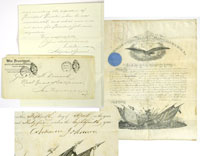 |
Johnson, Andrew (1808-1875) 17th President of the United States (1865-1869). Partly-printed Document Signed as President, on vellum, 19½ x 15¾ in., Washington, D.C., April 15, 1865. Appointing William H. Dimond "Assistant Adjutant General of Volunteers with the rank of Captain." Countersigned by E.M. Stanton as Secretary of War. The docket is signed by E.D. Townsend as Assistant Adjutant General at upper left. Usual military engravings are at top and bottom. Overall age toning and some minor ink transfer. A horizontal fold traverses Andrew Johnson's signature and another horizontal fold crosses the blue War Department seal.
Accompanying this document is a 1½ page letter from the War Department, Adjutant General's Office, datelined Washington, April 1888, addressed to General W. H. Dimond, National Guard of California, National Guard of California, responding to an inquiry by Dimond. In part: "…I have the honor to inform you that, as shown by the records, you were nominated to the Senate for captain and assistant adjutant general of volunteers March 3, 1865; that you were confirmed March 9, 1865, and commissioned under date of April 15, 1865. It may be added that your commission was one of a number which had been made out, and was awaiting the signature of President Lincoln when he was assassinated, and which were made out anew for President Johnson's signature." The transmittial envelope is postmarked April 6, 1888.
President Lincoln died at 7:22 AM April 15, 1865 as a result of the attack by John Wilkes Booth at Ford's Theater on the evening of April 14. Booth planned to destroy the administration by assassinating President Lincoln, Vice President Andrew Johnson, Secretary of State William H. Seward, and General Ullysses S. Grant. Grant had planned to attend the theater but changed his plans and did not attend. Seward was attacked in his home by Lewis Powell and gravely wounded. George Atzerodt, who had been assigned the task of assassinating Andrew Johnson, failed to carry out his part of the plan, and on the morning of the 15th, Andrew Johnson was sworn in as President by Chief Justice Salmon P. Chase. This military commission was one of the first documents signed by President Johnson on his first day in office.
Estimated Value $10,000 - 15,000.
View details and enlarged photo
| Unsold |
Lot 25 |
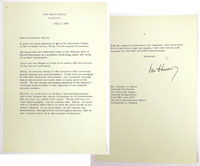 |
Kennedy, John F (1917-1963) 35th President of the United States (1961-63). Typed Letter Signed as President, on "The White House" letterhead, 1½pp, 10½ x 7 in., Washington, D.C., July 2, 1962. To the American Legion, on the occasion of the Legion's 44th Convention and three months before the Cuban Missile Crisis. In brief: "…There are two things we must do to assure that the terrors of war are not unleashed. First, we must be strong so that weakness does not tempt hostile nations into miscalculation….Second, we must prove to all those uncommitted peoples who hover between the choice of freedom or of Communism, that our way can satisfy their needs…." Staple holes at upper left and one small smudge above the signature, else fine.
Estimated Value $2,500 - 3,000.
View details and enlarged photo
| Realized
$3,760 |
Lot 27 |
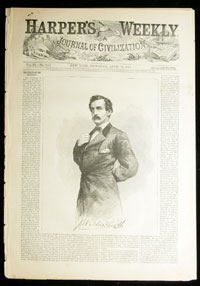 |
(Lincoln Assassination). April 29, 1865 issue of Harper's Weekly featuring a portrait engraving of John Wilkes Booth on the front cover, illustrating the front-page story: "The Murder of the President," which continues on the second page. The portrait shows Booth striking an actor's pose; his facsimile signature is below. 16 x 11¼ in. Illlustrations regarding the assassination include a two-page spread by Thomas Nast showing Liberty weeping over Lincoln's funeral bier. Paper has several pages which are separated at the spine and some edge tears, not affecting cover.
Estimated Value $300 - 500.
View details and enlarged photo
| Realized
$235 |
Lot 28 |
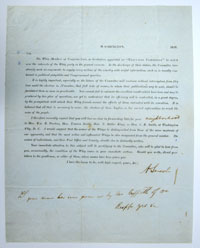 |
Lincoln, Abraham (1809-1865) 16th President of the United States. Printed Letter Signed "A. Lincoln," one page, 9¾ x 7½ in., Washington, D.C., 1848. In part: "Sir: The Whig Members of Congress have, as heretofore, appointed an �Executive Committee� to watch over the interests of the Whig party in the present canvass. In the discharge of their duties, the Committee have already made arrangements to supply every section of the country with useful information, such as is usually contained in political pamphlets and Congressional speeches. It is highly important, especially as the labors of the Committee will continue without interruption from this time until the election in November, that full lists of names, to whom their publications may be sent, should be furnished them as soon as practicable. You cannot fail to estimate the excellent results which have been and may be produced by this plan of operation, nor yet to understand that its efficiency will be controlled, in a great degree, by the promptitude with which their Whig friends second the efforts of those entrusted with its execution. It is believed that all that is necessary to secure the election of Gen. Taylor, is for correct information to reach the mass of the people…. I would suggest that the names of the Whigs be distinguished from those of the more moderate of our opponents, and that the most active and influential Whigs be also designated from the general number." The word "neighborhood" and the following postscript is in an unidentified hand: "PS Your name has been given me by Mr. Griffith of Va. Respfy yrs &c." The identity of Mr. Griffith of Virginia is unknown. Light creases, vertical fold passes through "c" of signature. Light stains in blank areas. Fine condition.
According to Roy P. Basler in "The Collected Works of Abraham Lincoln," Volume I, page 518, while Lincoln probably signed many of these circulars, there are two known, each with the same postscript. The one listed in Basler is postmarked August 17, and is addressed to John D. McGill, Urbanna, Middlesex, Virginia. It is owned by the Illinois State Historical Library. The other was addressed to James Smith, Fleetwood Academy, King & Queen, Virginia. It is not known if this is the one received by Smith or a third known circular.
Abraham Lincoln served his only term in Congress from March 4, 1847 to March 3, 1849, representing Illinois as its only Whig Congressman; he did not seek renomination. He attended the 1848 Whig National Convention in Philadelphia in June supporting Gen. Zachary Taylor for the nomination. When Congress adjourned in August, Lincoln began to campaign in earnest. He spent September campaigning for the Whig ticket in Massachusetts, then went home to campaign in Illinois. After Taylor�s election in November, Lincoln sought the office of Commissioner of the General Land Office in the new Taylor administration, but it was given to Chicago lawyer Justin Butterfield, who had supported Henry Clay for the 1848 Whig party presidential nomination; he had Clay�s and Daniel Webster�s endorsement for the post. Lincoln was offered the Governorship of Oregon Territory, but he declined. Oregon was strongly Democratic and Lincoln felt that once it became a state, it would never elect a Whig senator or governor. Besides, he didn�t want to move out west. Lincoln returned to his law office in Springfield, certain that his political career was over. Only seven letters signed by Lincoln while serving in Congress have appeared at major public auctions in the last 40 years. This one urging the election of Zachary Taylor as twelfth U.S. President, signed by the future sixteenth U.S. President, is particularly desirable.
Estimated Value $14,000 - 18,000.
View details and enlarged photo
| Unsold |
Lot 29 |
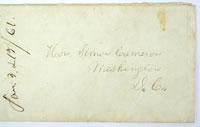 |
Lincoln, Abraham. Autograph Envelope addressed by Abraham Lincoln to "Hon. Simon Cameron / Washington D.C." January 3 & 13, 1861. Very good; the ink is a little light but clear. Recipient docketing on left side, "Mr. Lincoln" and date "Jan. 3 & 13/61" is not in Lincoln�s hand. Lincoln�s letter that was in this envelope is at the Library of Congress.
On January 3, the President-elect had written to Cameron attempting to withdraw an offer of a place in Lincoln's cabinet: "…you will relieve me from great embarrassment by allowing me to recall the offer…." On January 13, having learned that Cameron's "feelings were wounded by the terms of my letter," Lincoln assures Cameron "I say to you now I have not doubted that you would perform the duties of a Department ably and faithfully…" Cameron, who was party boss of Pennsylvania, had been offered a cabinet post as a reward for throwing his support to Lincoln at the Republican national convention. He was appointed Secretary of War, but by 1862, Lincoln could no longer abide Cameron's questionable ethics and appointed him minister to Russia to get rid of him.
Estimated Value $3,000 - 4,000.
View details and enlarged photo
| Unsold |
Lot 31 |
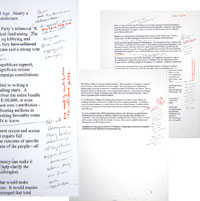 |
Obama, Barack (1960 -) 44th President of the United States (2009 -) Heavily corrected Typed Manuscript for an op-ed piece which appeared in The Chicago Tribune May 21, 2007, 11 x 8½ in., two separate pages, n.p. The piece was titled "The problem with bundling money" in the newspaper. Containing some 110 words in President Obama's hand (he was a candidate at the time), most in pencil and some in red ink, as well as several penciled lines marking through words or entire sentences, and some lines noting where new thoughts should be inserted. In the top right corner, Obama wrote in red ink, "Latest draft."
The article begins, "When it come to reforming Washington and limiting the power of special interests, a man who died more than 60 years ago had exactly the right idea. Supreme Court Justice Louis Brandeis said, Sunlight is said to be the best of disinfectants; electric light the most efficient policeman." [In this draft, Obama marked through "man who died more than 60 years ago had exactly the right idea" and after "Brandeis" wrote "had the right idea. Sixty years ago, he"]. In the third paragraph, Obama marked through "Today, powerful special intersts run Washington" and added "We have heard the stories of Delay, Abramoff and" before the next sentence, which states, "The Republican Party's infamous 'K Street Project' put lobbyists at the center of policymaking and political fundraising." After this sentence, Obama added, "But [he marked through his own words, "And we know that"] the dominance of special interests precedes this and extends well beyond these most eggregious [sic] examples." After "The drug and insurance industries alone have spent more than $1 billion on lobbying and campaign contributions in the last ten years. And, for the most part, they have achieved the results they wanted," Obama marked through "And" then marked that the "f" in "for" should be upper case, and marked through "have achieved the results they wanted," adding "For the most part, they got what they paid for--legislation that consistently titled [the misspelled word is marked throgh] tilted in their favor." He marked that a new paragraph should begin with "It's no wonder ['then' was added here] that last November ['last November' is marked through] Americans cast a strong vote for change."
In the fifth paragraph, which describes how bundling works, he inserts a comment which says in part, "Not all lobbyists are making contributions to influence policy. Many develop relationships w/legislators…because they believe they are the best cadidate [sic]." He notes that paragraphs six and seven are repetive and marks through all of paragraph seven. In this draft, paragraph eight begins, "That is why I proposed and the Senate passed legislation last year that would make lobbyists disclose how much they bundle and who they bundle it from." The first six words were deleted from the final version.
On page two, in the next to last paragraph, after the sentence, "I'm also reporting any bundled contributions that I receive," he adds, "I'm not perfect. In my current pres. campaign, I still have to raise money. I still have relationships w/lobbyists. But at least people know who those relationships are. Still need more far reaching cap ['cap' is marked through] public financing."
Obama's last sentence, which he crossed out in this draft, is not in the final version: "Transparency is the road to reform in Washington. Requiring the disclosure of bundled contributions from lobbyists can help lead the way." This is the only Obama edit that was in the final version. A few other words, not marked by Obama in this draft, were changed before the final version. Fine condition; hole punches in margin.
Estimated Value $6,000 - 8,000.
Ex Wendy Button, speechwriter for Barack Obama and Michelle Obama.
View details and enlarged photo
| Realized
$4,465 |
Lot 32 |
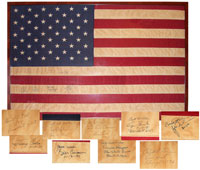 |
(Presidents) Flag Signed by Nine Presidents -- John F. Kennedy Through George W. Bush. Each man was President when he signed the flag, which measures 3 feet 7 inches by 5 feet 9 inches. The signatures are on the two white stripes beneath the field of stars.
On the first white stripe, from left to right:
(1) Gerald R. Ford signed and dated in black ball point pen, as President: "Gerald R. Ford 11/8/74 President USA."
(2) Richard Nixon signed and dated in blue ball point pen, as President: "Richard Nixon President February 17th, 1972."
(3) John F. Kennedy signed and dated in black ball point pen, as President: "For Dr. Bert Arthur with thanks and best wishes John Kennedy 1963."
(4) Lyndon B. Johnson signed and dated in black ball point pen, as President: "With best wishes Lyndon B. Johnson July 10th 1965."
(5) Jimmy Carter signed and dated in blue felt pen, as President: "Jimmy Carter 3/13/79."
On the second stripe, from left to right:
(6) George H.W. Bush signed and dated in black felt pen, as President: "George Bush 7/12/91."
(7) Ronald Reagan, signed and dated in blue felt pen, as President: "With Best wishes Ronald Reagan the White House March 8, 1982."
(8) Bill Clinton signed and dated in black felt pen, as President: "Best wishes Bill Clinton 11/3/96."
(9) George W. Bush signed and dated in blue felt pen, as President: "Best wishes George W. Bush 2002."
The flag was originally signed by President John F. Kennedy for Dr. Bert Arthur, a physician and friend of JFK's. Dr. Arthur presented the flag to a prominent Dallas, Texas family whose political connections gave them access to every President from Lyndon B. Johnson through Bill Clinton; the flag was signed and dated by each President in a family member's presence. In 2002, the prior owner of the flag arranged a meeting with President George W. Bush at the Coffee Station in Crawford, Texas, where President Bush graciously signed and dated the flag, becoming the ninth consecutive President to do so.
The present owner of the flag has done a great deal of research and has put together a notebook with copies of presidential schedules (for Presidents Nixon through George H.W. Bush) for the days he believes each President signed the flag.
This one-of-a-kind flag is in excellent condition. It has been handsomely framed to an overall size of 4 feet 1 inch by 6 feet. Please note: This item is not on site; it is located in Florida and will be shipped by an art packing and shipping service at the buyer's expense.
Estimated Value $50,000 - 75,000.
April 15, 2006 Goldberg auction, Lot 146, realized $86,250.
View details and enlarged photo
| Unsold |
Lot 33 |
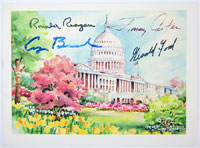 |
(Presidents) Ford, Carter, Reagan, and Bush. Color reproduction of the U.S. Capitol building signed by Gerald Ford, Jimmy Carter, Ronald Reagan, and George Bush, 4½ x 6 in., n.p., n.d. Very fine.
Estimated Value $1,000 - 1,200.
View details and enlarged photo
| Unsold |
Lot 34 |
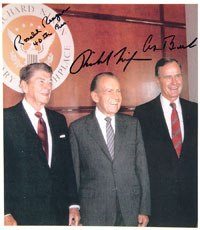 |
(Presidents) Richard Nixon, Ronald Reagan, and George Bush. Color Photograph taken at the Nixon Presidential Library in Yorba Linda, California and signed by all three presidents. The Library was dedicated in 1990. Fine condition.
Estimated Value $1,000 - 1,200.
View details and enlarged photo
| Realized
$1,140 |
Lot 35 |
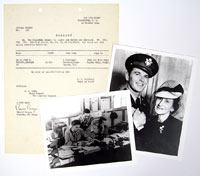 |
Reagan, Ronald (1911-2004) 40th President of the United States (1981-1989). Early Typed Document Signed "Ronald Reagan" as Captain, Air Corps, one page, 8" x 10½ x 8 in. Issued by the War Department, Washington, D.C., October 14, 1944, but signed at a later date at the 18th AAF Base Unit in Culver City, California. Being a carbon copy on thin paper signed in ink. Staple holes in upper left, two file holes at top. Fine condition.
The 33-year-old Air Corp Captain certifies this document as "A True Copy." An "extract" from Special Orders No. 247 issued by General George C. Marshall as Army Chief of Staff by order of the Secretary of War (Henry L. Stimson), concerning 2nd Lieutenant John R. Roberts� assignment to the 18th Army Air Force Base Unit, Culver City, California, from "O Strategic Services, Washington, D.C." on October 21, 1944 "EDCMR" (Effective Date Concerning Morning Report). Certified "Official" by Major General James A. Ulio, the Adjutant General of the Army. The Office of Strategic Services (OSS), America�s first intelligence agency, forerunner of the CIA, was created on June 13, 1942. Accompanied by two excellent photographs (not vintage) of Captain Reagan, one depicting him with his mother, Nelle Reagan (7¼ x 6 in.), and the other at his desk in Culver City with his name plate on his desk: "Capt. R.W. Reagan" (5¼ x 6½ in.).
Estimated Value $1,000 - 1,200.
View details and enlarged photo
| Unsold |
Lot 36 |
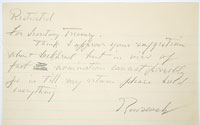 |
Roosevelt, Franklin D (1882-1945) 32nd President of the United States (1933-45). Autograph Message Signed "Roosevelt" as President, one page, in pencil on ruled paper, 10 ½ x 8 in., n.p. (at sea), n.d. Marked "Restricted / For Secretary Treasury" at top, FDR writes a message for radio transmittal: "Think I approve your suggestion about Lockheed but in view of fact nomination cannot possibly go in till my return please hold everything."
Given the mention of Lockheed, the message could possibly have something to do with the Lend-Lease Bill signed by the President on March 11, 1941, which gave him the power to sell, transfer, exchange, or lend equipment to any country which needed help defending itself against the Axis powers. Of the $50 billion appropriated by Congress, some $31 billion went to Great Britain.
Estimated Value $1,800 - 2,200.
View details and enlarged photo
| Unsold |
Lot 37 |
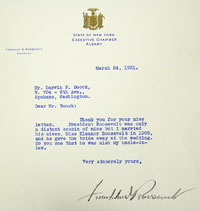 |
Roosevelt, Franklin D. Typed Letter Signed as Governor of New York, on Executive Chamber letterhead, one page, 10½ x 8 in., Albany, March 24, 1931. To Mr. Darwin F. Boock in Spokane, Washington. In part: "…President Roosevelt was only a distant cousin of mine but I married his niece, Miss Eleanor Roosevelt in 1905, and he gave the bride away at the wedding. So you see that he was also my uncle-in-law." Fine condition; boldly signed. Excellent and unusual content. Franklin and Theodore were fifth cousins. Eleanor was Theodore's niece, being the daughter of his brother Elliot.
Estimated Value $1,250 - 1,500.
View details and enlarged photo
| Realized
$1,528 |
Lot 38 |
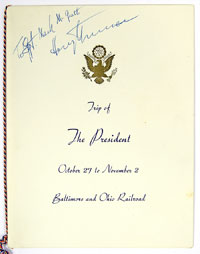 |
Truman, Harry S (1884-1972) 33rd President of the United States (1945-1953). Menu Signed and Inscribed as President, "To Sgt. Mack McGrath / Harry S Truman," 8½ x 6½ in., n.p. n.d. (1952) The menu is embossed with a gold Presidential Seal and is engraved, "Trip of The President October 27 to November 2 Baltimore and Ohio Railroad," and has a red, white, and blue tassel. In the center is a breakfast menu. Light toning, else fine. Truman was campaigning across the country for Democratic presidential nominee Adlai Stevenson. As a result of Franklin Roosevelt's four terms (albeit the fourth was cut short by his death), the 22nd Amendment was passed in 1951, preventing any President from being elected to a third term or a second term if he had served more than two years of a previous President's term, but a grandfather clause excluded the current President from that provision. Truman, however, chose not to run again. The recipient of the menu was Sgt. Wayman McGarrh; however, President Truman miswrote his name.
Estimated Value $500 - 600.
View details and enlarged photo
| Unsold |
Lot 39 |
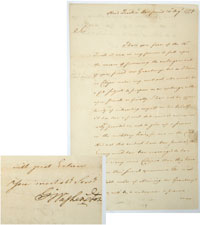 |
Washington, George (1732-1799) Commander-in-Chief of the Continental Army and First President of the United States (1789-1796). Letter Signed G:o Washington" as Commander-in-Chief of the Continental Army, 1½ pages, 11¾ x 7¼ in., Head Quarters West Point, August 25, 1779. Although unnamed on this letter, we know that Washington was writing to Joseph Hewes, signer of the Declaration of Independence from North Carolina and a member of the Continental Congress because the Papers of George Washington in the Library of Congress has Washngton's retained copy with Hewes listed as the recipient. Hewes had asked Washington to help gain the "enlargement" (release) of a friend captured by the British. Very good; encapsulated. The body of the letter is in the hand of Lt. Col. Tench Tilghman, secretary and later aide-de-camp to Gen. Washington. Choice bold "G:o Washington" signature.
Washington refuses to trade military prisoners in exchange for civilian hostages taken by the British and explains why: "…I wish it were in my power to fall upon the means of procuring the enlargement of your friend Mr.Granberry, but as I have no Citizen under my controul who would be a fit subject to propose as an exchange, either upon parole or finally, I have not an opportunity of interesting myself in his behalf. It has been a point determined and invariably pe[r]sisted in, not to give up a person in the military line, for one in the Civil. Had not this conduct have been pursued, the Enemy would have been encouraged to have seized many more Citizens than they have done in their several excursions. The most probable mode of obtaining Mr. Granberry�s release, will be, to endeavor to procure some Gentleman who may be already, or may hereafter be captured by a Vessel belonging to the State of which he is an inhabitant."
Estimated Value $40,000 - 60,000.
View details and enlarged photo
| Realized
$31,625 |
Lot 40 |
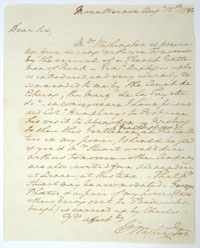 |
Washington, George. Autograph Letter Signed "G:o Washington," one page, " 9¼ x 7¼ in., Mount Vernon, August 15, 1786. With autograph address leaf to "Doctr. Stuart / Abingdon / 1786." Washington announces "the arrival of a French Gentleman of Rank--Genl. Duplessis" who was recommended by the Count d'Estaing and the Marquis de la Fayette, and rearranges his and Mrs. Washington's schedule to accommodate the visit of the general. Very fine.
In full: "Dear Sir, Mrs. Washington is prevented from dining with you tomorrow by the arrival of a French Gentleman of Rank � Genl. Duplessis � who is introduced, and very warmly recommended to me by the Count de Estaing, the Marq.s de la Fayette &c.a. In consequence I have persuaded Colo [David] Humphreys to postpone his visit to Abingdon. Wishing to show this Gentleman (Genl Duplessis) all the Civilities in my power, I should be glad if you & Mrs. Stuart would dine with us tomorrow. � other Company are also invited from Alexandria at Dinner, at this time. That Mrs. Stuart may be accommodated, George�s Phaeton & a pair of my horses (two others being sent to Fredericksburgh) is carried up by Charles. Yrs. affect.ly G:o: Washington."
In November 1783, two months after the formal peace treaty with Great Britain was signed, Washington had returned home to Mount Vernon to tend to his neglected fields and fortune. He maintained an interest in political affairs, and in foreign affairs favored the French over the English, mindful of France's contributions of money, soldiers, and her Navy during the Revolutionary War. Washington's close friendship with the younger Lafayette, forged during the crucible of war, was a significant factor in his attitude toward the French. Gilbert du Motier, Marquis de Lafayette (1757-1834) was a young French aristocrat and military officer who volunteered his services to the cause of the American Revolution and fought in the Continental Army from 1777 through 1781. Washington treated him like the son he never had.
In July 1786, Washington received letters from the Marquis de Lafayette and the Comte d�Estaing, introducing French general Jean-Baptiste Vigoureux du Plessis, who served briefly as Governor of the colony of St. Vincent in the Caribbean and who came to the United States in 1786, seeking to establish a plantation in Georgia. Washington warmly invited du Plessis to visit "the peaceful shades of Mount Vernon," an important tourist attraction for European visitors at that time. In March 1787, du Plessis wrote expressing his thanks to Washington for his hospitality. He subsequently returned to France after an illness which he believed was caused by the low-country Georgia environment.
During the summer of 1786, Washington experienced the deaths of three of his most trusted revolutionary comrades: Nathanael Greene, Tench Tilghman, and Alexander McDougall. In an August 1st letter to Thomas Jefferson, then in Paris, he connected their passing with his concern for the future of America. "Thus some of the pillars of the revolution fall. Others are mouldering by insensible degrees. May our Country never want props to support the glorious fabrick!"
Just a month after Du Plessis�s visit, Shays�s Rebellion would erupt in Massachusetts, bringing the specter of class warfare and sectional discord to America. More than any other event, Shays�s Rebellion would convince Washington to step back into public affairs, where he would exercise leadership in the movement to draft a new federal constitution the following year.
Dr. David Stuart (1753-1814) was a longtime friend and neighbor of Washington. He studied medicine at Paris and Edinburgh and practiced in the Alexandria area, and later served on the commission establishing the boundaries of Washington, D.C.
Mrs. Stuart, Eleanor Calvert Custis, was the granddaughter of Charles, Fifth Lord Baltimore, and the widow of Martha Washington�s son (John Parke Custis). Her daughter, Eleanor Parke Custis, was Martha Washington�s only granddaughter, and George Washington adopted her as his own daughter.
Charles Hector d�Estaing (1729-1794) was an Admiral who brought part of the French Navy to assist the revolutionaries in America in 1778. He managed his fleet cautiously, spent part of 1778 and 1779 in the Caribbean, and failed in his attempt to retake Savannah for the Americans, before departing in 1780. His replacement, however, the Comte de Grasse, lent critical support to the 1781 land campaign of Washington and Rochambeau, leading to the encirclement and defeat of Cornwallis at Yorktown. D�Estaing was a victim of the guillotine during the Reign of Terror.
David Humphreys (1752-1818), a Connecticut soldier, served as aide-de-camp and advisor to George Washington. Humphreys was chosen for the ceremonial role of escorting the surrendered British colors to Congress after the Battle of Yorktown. He was also an entrepreneur and a distinguished writer, participating with Joel Barlow, John Trumbull and others in "the Hartford Wits."
A beautifully penned, superb quality Washington Autograph Letter Signed. The perfect Washington letter to be framed ad displayed.
Estimated Value $30,000 - 40,000.
View details and enlarged photo
| Realized
$25,875 |
Lot 41 |
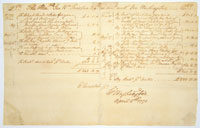 |
Washington, George. Autograph Document Signed twice, once "G:o Washington" at the end and once "Geo: Washington" in the title, one page, 9¼ x 14¾ in. (Mount Vernon), April 6, 1775. Being an account remitted by George Washington to George William Fairfax regarding expenses and income incurred June-December 1774 for the sale of goods at and rental of Fairfax's estate, Belvoir. Center fold and two horizontal folds strengthened on verso, tear to lower left corner repaired, bottom corners spotted.
Washington's lifelong association with the powerful and influential Fairfax family stemmed from the marriage of his half-brother Lawrence to Anne Fairfax, who was the daughter of William Fairfax, first cousin to Thomas Fairfax, sixth Baron Fairfax of Cameron. William was the land agent for his cousin, who was proprietor of five million acres of land between the Potomac and the Rappahannock Rivers, from their mouths to their headwaters. Lord Fairfax held the exclusive power to grant lands in the Northern Neck, as this region was called, as well as to collect quitrents. Thanks to Lawrence, George became a close friend of William's son, George William Fairfax, who was seven years older than he. Their friendship was cemented by a surveying trip to the Shenandoah Valley in March 1748, during which the 16-year-old George Washington served as assistant surveyor to his friend.
George William Fairfax was a member of the governor's council and a collector of customs for the South Potomac naval district. In 1757 he inherited Belvoir, which was located on a bluff overlooking the Potomac, a couple of miles downriver from Mount Vernon. George and Martha Washington frequented Belvoir, where George William lived with his wife, Sarah "Sally" Cary Fairfax. (Washington's feelings for Sally Fairfax have long been subject to speculation.) Years later Washington wrote to Sally that his visits to Belvoir counted among "the happiest days of my life" (February 27, 1785, DLC:GW).
In 1773 George William left for London on family property business, leaving a Power of Attorney with Washington, whom he had designated, among others, to look after his interests at Belvoir. Washington would see to Fairfax's affairs until he left for Boston in 1775 to become Commander-in-Chief of the Continental Army. In his letter to Washington dated January 10, 1774, Fairfax writes: "… the Chancery business, I came here to Prosecute, will probably detain me for some Years, and to You my Friend, I will speak still more plain, and say at present I have no thoughts of returning to Virginia at any distance of time … But in Case I should ever return, I should not choose to live at Belvoir, but would fix myself in the Southern part of the Country, and nearer to the Metropolis, at a Place of my Wife's Brothers. Therefore I have no Objections to letting Belvoir for a Term of Years, seven, eleven, or fourteen, but would not choose to exceed that time, as I don't expect to Live to see the Lease expire …" He also requests that Washington put up Belvoir's furnishings for sale. "As Furniture is not the better for keeping, I could wish it should be sold and have it sett up, in Currency, which is cost Sterling." George William would never return to America; he wrote Washington on August 3, 1778 that after twenty years in litigation: "the Chancery Suit that brought me over, is as far from a conclusion as ever" (DLC:GW). George William died in England in 1787.
Washington's balance sheet, dated April 6, 1775, indicates costs for an advertisement in an Annapolis paper for the renting of Belvoir in June 1774. Another advertisement was placed in October. There are also payments received from various individuals, including a Wilton carpet bought by Dr. Craik on August 17th. Dr. James Craik was George Washington's personal physician. The two became friends during the French and Indian War, and Craik would serve as Physician General during the Revolution; he was with Washington when he died. Other purchases for sundries, a pair of scales, etc., by Col. Lyme, Col. Lewis, Adam Lynn, Francis Willis, Abednego Adams, and Mr. Craven Payton are recorded.
Washington would refer to this balance sheet in his letter to Fairfax dated June 30, 1786 ("The inclosed acct, commencing with the ball[anc]e of the one transmitted 6th of April 1775"; see Papers of George Washington, Confederation Series, 4:137, note on 140). The Rev. Andrew Morton rented and moved into the house in early 1775 (see Papers of George Washington, Colonial Series 10:252-253). The mansion and several outbuildings were destroyed by fire in 1783. The British destroyed what was left of the mansion during the War of 1812.
On June 15, 1775, two months and nine days after signing this document, Washington was unanimously selected by the Continental Congress as Commander in Chief of the Continental Army. On June 16th, Washington accepted the commission and on July 3, in Cambridge, Massachusetts, he took command of the Army.
Estimated Value $20,000 - 30,000.
View details and enlarged photo
| Realized
$14,100 |
Lot 42 |
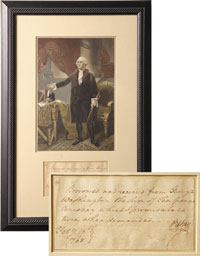 |
Washington, George. Autograph Document Signed "George Washington" in the third person in the text, 3¼ x 6¼ in., n.p., Feb. 13, 1768. Washington writes: "Borrowed and receivd from George Washington the Sum of Ten pounds Currency which I promise to return when demanded…." T. Ellzey signs in receipt. Closed tear in lower right corner under Ellzey's signature, else fine. Matted with a vintage, handcolored engraving of Washington and artfully framed to an overall size of 22¾ x 14¾ in.
Thomasin Ellzey was a vestryman in nearby Truro Parish and a hunting companion of Washington's. Thomasin's brother, William, was Washington's lawyer. Of note is an entry in Washington's diary for Feb. 12, 1768, the day before he made this loan, noting that Thomasin Ellzey was a member of Washington's fox-hunting party. Washington's ledger for Feb. 13 records this loan of ten pounds to Ellzey.
Estimated Value $9,000 - 12,000.
View details and enlarged photo
| Unsold |
|
|